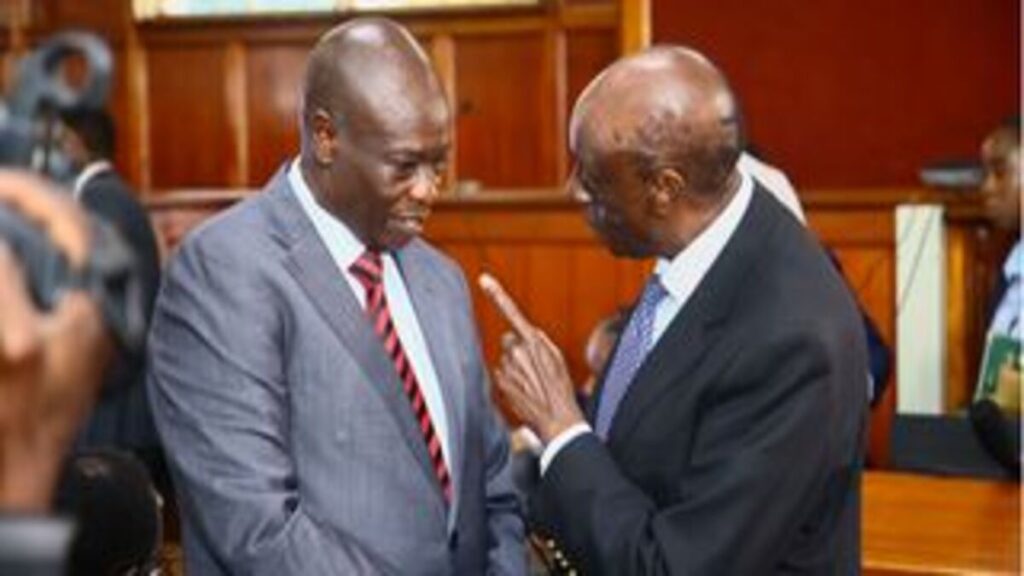In a significant development that has gripped Kenya’s political landscape, the High Court will hear multiple petitions challenging the removal of Rigathi Gachagua from his position as Deputy President in January 2025. The petitions also contest the appointment of former Interior Cabinet Secretary Professor Kithure Kindiki as his replacement.
The court’s decision to schedule the hearings for January has intensified the political tension surrounding one of the most controversial leadership changes in Kenya’s recent history. Legal experts suggest this timing will allow all parties to prepare thoroughly for what promises to be a landmark case in Kenya’s constitutional journey.

Impeached DP Rigathi Gachagua with his lawyer Paul Muite at the Milimani High Court in Nairobi on October 22, 2024.Courtesy photo
The petitioners, whose identities remain undisclosed in court papers, are questioning the constitutionality of Gachagua’s removal from office. They argue that the process leading to his exit and subsequent replacement with Prof Kindiki deserves careful judicial scrutiny.
“The scheduling of these petitions for January 2025 demonstrates the judiciary’s commitment to addressing this matter comprehensively,” says Dr James Mwangi, a constitutional law expert at the University of Nairobi. “The stakes are incredibly high, as this case could set a precedent for future political transitions in Kenya.”
The controversy has sparked heated debates across the country, with supporters on both sides voicing their opinions. Gachagua’s allies maintain that his removal was unconstitutional and politically motivated, while those backing Prof Kindiki argue that the change was necessary for effective governance.
Political analysts point out that this case will test the strength of Kenya’s democratic institutions. “The way the judiciary handles these petitions will either strengthen or weaken public confidence in our constitutional framework,” notes Sarah Kimani, a political analyst based in Nairobi.
The impact of this leadership dispute extends beyond the political arena. Business leaders express concern about potential effects on investor confidence during this period of uncertainty. The Kenya Private Sector Alliance has urged for a swift and transparent resolution to maintain economic stability.
Meanwhile, Prof Kindiki continues to perform the duties of Deputy President, though under the shadow of these pending legal challenges. His supporters praise his technocratic approach to leadership, citing his previous experience as Interior Cabinet Secretary.
The case has drawn attention to Kenya’s constitutional provisions regarding the removal and replacement of a Deputy President. Legal scholars are particularly interested in how the court will interpret these provisions, as this case could establish important legal precedents.
“This is not just about individuals,” emphasises Dr Martha Karua, a veteran constitutional lawyer. “It’s about establishing clear guidelines for leadership transitions and protecting our democratic institutions.”
The hearings will address several key questions: Was the process of removing Gachagua constitutional? Did the appointment of Prof Kindiki follow proper legal procedures? What remedies are available if the court finds irregularities in either process?
Civil society organisations have also taken a keen interest in the case. The Kenya Human Rights Commission has announced plans to submit an amicus curiae brief, highlighting the importance of protecting constitutional democracy.
“We must ensure that political changes, however necessary they might seem, strictly follow constitutional provisions,” says John Githongo, a prominent civil society leader. “This case will test our commitment to the rule of law.”
The January hearings will likely attract significant media attention, with local and international observers watching closely. Court officials have already begun preparing for increased security and media presence during the proceedings.
As the country awaits these crucial hearings, political activities continue under a cloud of uncertainty. Both Gachagua and Prof Kindiki’s supporters are mobilising resources and legal expertise for what promises to be a defining moment in Kenya’s political history.
The outcome of these petitions could have far-reaching implications for Kenya’s political landscape. A ruling either way will likely influence future political alignments and potentially reshape the country’s approach to executive leadership transitions.
For now, Kenyans must wait until January 2025 for the court to begin unravelling this complex political and legal knot. The hearings will not only determine the fate of two prominent political figures but also help define the boundaries of constitutional democracy in Kenya.
As the nation approaches this crucial legal battle, all eyes remain fixed on the judiciary, whose decision will undoubtedly leave an indelible mark on Kenya’s democratic journey.